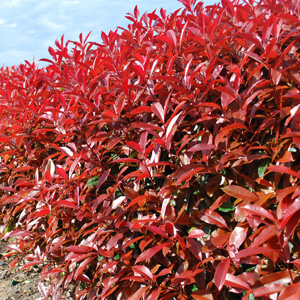How to Grow a Hedge
It seems like the popularity of garden hedges continues to increase every year. It’s no wonder they are so popular, hedges are a stylish natural alternative to conventional fences. With a little bit of care and maintenance, they can also double as great windbreaks or privacy screens. Growing hedges may seem complicated, but the truth is that it’s a relatively easy process when you start with the right information. Here’s our step-by-step guide on selecting your perfect plant variety and growing an enviable hedge in your garden.
Hedging Plant Varieties
Selecting the right plant variety to use as a hedge is an important choice. A plant variety that suits your situation not only makes it easier to care for your hedge, but also boosts its ability to perform well in your environment. Here are just a few of the best plants for hedges on offer at Garden Express:
English Box
As a slow-growing evergreen dwarf shrub, English Box has a very dense growth habit that makes it perfect for formal evergreen hedges or path borders. Its glossy green leaves are oval shaped and shade tolerant, making them ideal for a variety of gardening activities, including formal hedging, clipping or topiary.

English Box Buxus 14
Pittosporum Silver Sheen
Pittosporum Silver Sheen is a fast growing evergreen hedge with stunning variegated silvery green foliage. As it responds well to pruning, the Pittosporum Silver Sheen is an ideal variety for formal hedging or screening along paths and driveways. While it does prefer full sun, it can also tolerate shade. Most Pittosporums will cope with small amounts of frost and will not require much water once established.

Pittosporum Screen Between I17
Photinia Red Robin
Photinia Red Robin is an adaptable evergreen shrub with fast growing, small foliage. With magnificent red new growth and dark green leaves, it can be used to create a dense hedge or screen that displays red highlights throughout the year.

Photinia Red Robin – Garden Express Australia
How to Plant a Hedge
Growing a hedge can take some time, but it is ultimately a very rewarding process.
1. Select your shrubs
Whether you’re trying to create a fast growing privacy hedge or a small decorative garden border, it’s important to select a shrub that suits your needs. Additionally, you need to ensure you have enough plants to make a dense hedge for your chosen space. If you’re unsure about which plant variety to use, or how many you will need, you can ask the team at Garden Express for their recommendations.
2. Prepare your soil
To ensure roots do not become water-logged, use a well draining soil for your hedge. In your planting area, dig holes for your hedge trees at about 35cm deep. Remember that your hedge will form faster if you plant each shrub closer together but too close will cause issues with competing roots. Always stick to the recommendations for the minimum planting distance.
3. Plant your hedge
Place a handful of compost into each hole, tease the roots of the plant, and then place the plant into the middle of the hole. You can fill the remainder of the hole with soil and compress the dirt. Repeat this process until you have planted your full hedge row.
4. Water as required
Hedging plants prefer being well watered, especially in their initial period of growth and establishment. Ensure you water regularly during dry seasons such as Spring and Summer. You may also like to install a drip watering line as a convenient way of watering the hedge.
5. Shape your hedge
Shaping and pruning will need to be completed several times during your hedge’s initial growing period to encourage bushy growth and keep the plants in shape. For formal hedging this will involve regular pruning to prevent the hedge looking bushy or straggly. For informal planting or specimen shrubs, you can encourage compact growth by trimming lightly once or twice during the growing season.
For a wide range of good hedge plants, Australia looks to Garden Express. There are so many reasons to add a hedge to your garden this year, and our quality plant varieties are designed to suit your needs. Browse our range here, or fill out our online contact form and one of our gardening experts will be in touch.








Comments are closed.